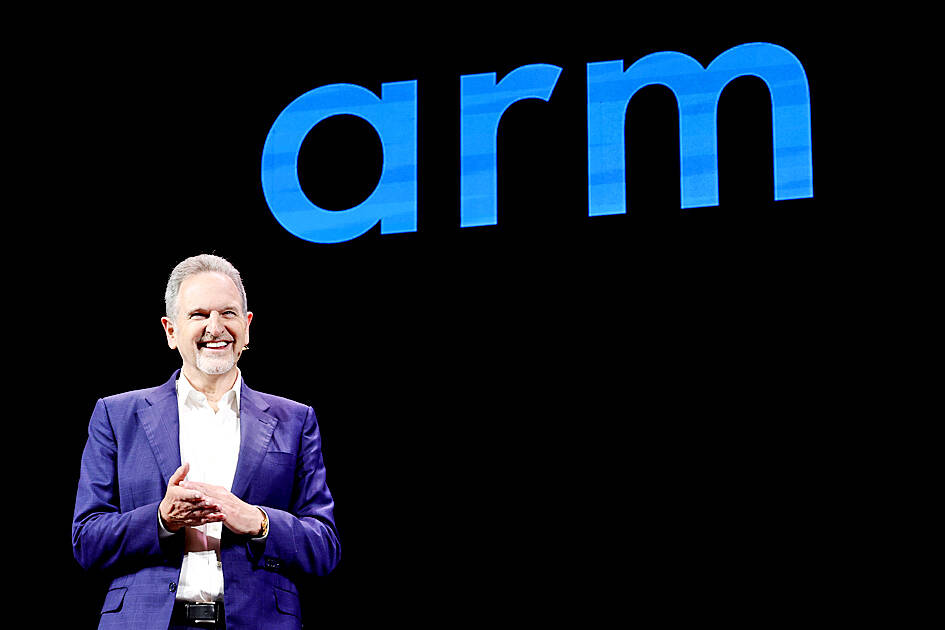Arm Holdings PLC aims to gain more than 50 percent of the Windows PC market in five years, CEO Rene Haas said on Monday as Microsoft Corp and its hardware partners prepare to launch a new batch of computers based on the British chip designer’s technology.
Demand for use of Arm’s technology in PCs received a boost after Microsoft last month unveiled ambitious plans to launch a new line of PCs with artificial intelligence (AI) features to compete with Alphabet and Apple Inc.
Its flagship Windows operating system is now to run on chips designed by Arm, whose technology powered the rise of smartphones. Chips made by Intel Corp have dominated the PC industry for decades and if the Arm push succeeds, it would reorder the market.

Photo: Ritchie B. Tongo, EPA-EFE
“Arm’s market share in Windows — I think, truly, in the next five years, it could be better than 50 percent,” Haas told Reuters in an interview.
Microsoft has made a significant commitment to ensure its alternative technology to Advanced Micro Devices Inc (AMD) and Intel’s x86 technology is embraced by consumers, building a suite of software developer tools to make it possible to produce programs that function on Arm-based chips.
“They’ve [Microsoft] gone way beyond anything they had [in developer tools] and they really picked it up in the last couple of years,” Haas said. “They are very, very much committed from a software standpoint.”
Microsoft and hardware vendors are following in Apple’s footsteps. The company has achieved success following its introduction of Arm designs. It has sold machines with its “M Series” processors for roughly four years and those chips offer long battery life and speedy performance.
Qualcomm Inc has designed the first Arm-based chip to introduce consumers and businesses to the new Windows-based Arm machines, but other vendors will follow, Haas said.
Microsoft also has a battery of device makers signed on to sell machines with Arms-based system such as Asustek Computer Inc (華碩) and Dell Technologies Inc.
At his keynote speech delivered at the Computex Taipei trade show earlier on Monday, Haas said he expected 100 billion Arm devices worldwide would be ready for AI by the end of next year.

UNCERTAINTY: Innolux activated a stringent supply chain management mechanism, as it did during the COVID-19 pandemic, to ensure optimal inventory levels for customers Flat-panel display makers AUO Corp (友達) and Innolux Corp (群創) yesterday said that about 12 to 20 percent of their display business is at risk of potential US tariffs and that they would relocate production or shipment destinations to mitigate the levies’ effects. US tariffs would have a direct impact of US$200 million on AUO’s revenue, company chairman Paul Peng (彭雙浪) told reporters on the sidelines of the Touch Taiwan trade show in Taipei yesterday. That would make up about 12 percent of the company’s overall revenue. To cope with the tariff uncertainty, AUO plans to allocate its production to manufacturing facilities in

TAKING STOCK: A Taiwanese cookware firm in Vietnam urged customers to assess inventory or place orders early so shipments can reach the US while tariffs are paused Taiwanese businesses in Vietnam are exploring alternatives after the White House imposed a 46 percent import duty on Vietnamese goods, following US President Donald Trump’s announcement of “reciprocal” tariffs on the US’ trading partners. Lo Shih-liang (羅世良), chairman of Brico Industry Co (裕茂工業), a Taiwanese company that manufactures cast iron cookware and stove components in Vietnam, said that more than 40 percent of his business was tied to the US market, describing the constant US policy shifts as an emotional roller coaster. “I work during the day and stay up all night watching the news. I’ve been following US news until 3am

COLLABORATION: Given Taiwan’s key position in global supply chains, the US firm is discussing strategies with local partners and clients to deal with global uncertainties Advanced Micro Devices Inc (AMD) yesterday said it is meeting with local ecosystem partners, including Taiwan Semiconductor Manufacturing Co (TSMC, 台積電), to discuss strategies, including long-term manufacturing, to navigate uncertainties such as US tariffs, as Taiwan occupies an important position in global supply chains. AMD chief executive officer Lisa Su (蘇姿丰) told reporters that Taiwan is an important part of the chip designer’s ecosystem and she is discussing with partners and customers in Taiwan to forge strong collaborations on different areas during this critical period. AMD has just become the first artificial-intelligence (AI) server chip customer of TSMC to utilize its advanced

Six years ago, LVMH’s billionaire CEO Bernard Arnault and US President Donald Trump cut the blue ribbon on a factory in rural Texas that would make designer handbags for Louis Vuitton, one of the world’s best-known luxury brands. However, since the high-profile opening, the factory has faced a host of problems limiting production, 11 former Louis Vuitton employees said. The site has consistently ranked among the worst-performing for Louis Vuitton globally, “significantly” underperforming other facilities, said three former Louis Vuitton workers and a senior industry source, who cited internal rankings shared with staff. The plant’s problems — which have not